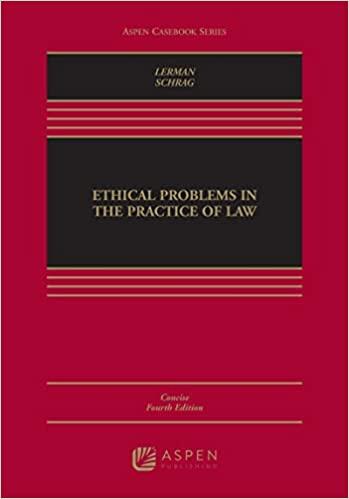Question
1. James, Kinkaid, the owner of the Kinkaid Company was convinced by Douglas Shaw, one of his employees, that a fellow worker, Dick Miller, had
1. James, Kinkaid, the owner of the Kinkaid Company was convinced by Douglas Shaw, one of his employees, that a fellow worker, Dick Miller, had been stealing money from the company. During a break in the company's conference room, Kinkaid fired Miller in front of other workers, accused him of stealing from the company, searched through his brief case over his objections, and finally forcibly escorted him to his office to await the arrival of the police, which he had his assistant summon. Miller was indicted for embezzlement but subsequently was acquitted upon establishing his innocence. What rights, if any, does Miller have against Kinkaid? Please discuss.
2. Sandra Davis was a worker in a New York hotel owned by the Royal Crown International Hotel Co. One day, Henry Lambert, the manager of the hotel support team, gathered all the workers and told them that a great deal of theft had taken place within the hotel. He warned the assembled workers that unless someone confessed or revealed the name of the responsible person, he would start to fire all the workers according to seniority. When no one volunteered the information he was seeking, Lambert fired Sandra Davis, a single parent of three small children. Ms Davis became very upset, began to cry, sustained emotional distress, mental anguish, and loss of wages and earnings.
Ms. Davis sued the Royal Crown International Hotel Co and Henry Lambert alleging that the defendants acted recklessly and outrageously, intending to cause emotional distress and anguish. The defendants argued that damages for emotional distress are not recoverable unless physical injury occurs as a result of the distress. Will Davis be successful on her complaint? Please explain.
3. Fred Banyon, the owner of a rural property, has a place on his land where he piles trash. The pile has been there for three months. Carl, a neighbor of the adjoining property, without Fred's consent or knowledge, threw his trash onto the trash pile. Fred discovered what Carl had done and sued. What tort, if any, has Carlcommitted? Please explain.
Step by Step Solution
There are 3 Steps involved in it
Step: 1

Get Instant Access to Expert-Tailored Solutions
See step-by-step solutions with expert insights and AI powered tools for academic success
Step: 2

Step: 3

Ace Your Homework with AI
Get the answers you need in no time with our AI-driven, step-by-step assistance
Get Started


